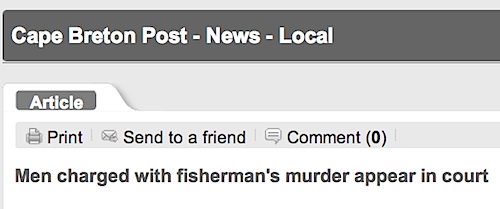25 Jun The dead man was a notorious bully who continually threatened others
On Monday, CBC reporter Phonse Jessome recounted sensational excerpts from what purported to be a confession by one of the fishermen accused of killing Philip Boudreau June 1. He supplemented his reporting with editorial comments that portrayed the killing as an unfathomable escalation of a feud over “fishing territory.”
Based on widely known but lightly reported facts, the escalation is not unfathomable. To portray it as arising out of a “feud” over “territory” is to adopt one side in highly contentious matter.
Tuesday, while reporting a brief court appearance by the accused men, Jessome added more editorial commentary, stressing the trauma experienced by the Boudreau’s family, portraying defense lawyer Joel Pink as “crafty,” and accusing defense lawyer Nash Brogan of “blaming the victim” for comments that, in my view, gave a more accurate account of the backstory than the CBC’s.

There’s an odd uncertainty about exactly what documents the CBC possesses or has seen. At various points, CBC newscasters, program hosts, and Jessome himself described the reporter as having “obtained the police file,” “obtained parts of the police file,” “read the police file,” “read parts of the police file,” and even, in one statement by Jessome, as having “read the file several times.”
Throughout his reports, Jessome appears to be describing the statement, not quoting from it, and quotation marks are conspicuously absent from the CBC’s written version of the story.
These discrepancies may amount to nothing more than sloppiness, but the CBC ought to clear them up. Knowing first hand how thoroughly CBC producers and lawyers vet stories like this, I find the circumlocution unusual. There is a big difference between having obtained (and retained a copy of) an entire police file, and having been shown parts of a file selected by someone with an interest in the case.
There’s another problem. Where do you get access to a police file in a murder prosecution? Almost certainly from the police or the prosecutors. Given that the death appears to have grown out of an altercation, police and prosecutors may have trouble getting a second degree murder conviction against any one of the accused, let alone all three*. Whether selected by police, prosecutors, or Jessome, the précis Jessome presented served to buttress a charge of murder, rather than manslaughter, against the man who pulled the trigger, and to implicate the two other crewmen in the most serious elements of the crime.
Any reporter given access to the electrifying documents Jessome saw or obtained would have reported their contents. Still, I wish the CBC had gone beyond its rote caution that the information “has not been admitted into evidence, or tested in court,” and examined the reasons why someone on one side of the case may have wanted this part of the police file to come out now, months before trial.
Throughout his reporting, Jessome adopts the line of the dead man’s family and supporters to misrepresent the killing as a feud arising out of a dispute over “fishing territory.” There is no territory in the lobster fishery. Any fisherman licensed to catch lobster in District 26 District 29 is legally entitled to set traps anywhere around Isle Madame. Informal traditional family fishing berths may be deeply felt, but they have no legal standing.
In any case, Boudreau was not a fisherman, a fact the news media still fails to grasp more than three weeks after the incident. Here’s an online headline from today’s Cape Breton Post:

And from the Halifax Chronicle-Herald:

(To their credit, Herald editors apparently caught the error. Later online versions of the story omit the fisherman reference.)
Even if Jessome accepts the local tradition of family-based lobster berths, Boudreau, as a non-fisherman, had no territory to defend by cutting traps. What he did have was a long criminal record for property crimes. The community knew him as a bully who, among other things, frequently threatened to burn down the homes of anyone who crossed him.
For years, Boudreau used a small motorboat to steal lobster from the traps of licensed fishermen, then brazenly sold them by the side of the road in Isle Madame. He took sport in speeding past working fishermen, taunting them by waving lobsters he had just removed from their traps.
This spring, Boudreau escalated his vandalism by cutting the buoy lines from traps of fishermen who allegedly encroached on an area where his brother liked to fish.
In a local store on the night before his death, Boudreau encountered one of the men who would be accused of killing him the next day. He brandished a knife at the fisherman, and used it to demonstrate how he had cut the lobsterman’s traps.
Let me pause here in anticipation of those who may accuse me of justifying the taking of human life. Murder and manslaughter are never justified. The people of Isle Madame are rightly horrified at the events of June 1. I share their horror and dismay, but sugar-coating the events leading up to the crime serves no useful purpose.
Today’s media have a growing appetite for glorifying victims of crime that I find distasteful—and sometimes suspect. Maudlin, one-sided portrayals of the family dynamics in this case do nothing to illuminate the events.
This leads me to my greatest objection to news coverage of the Boudreau murder. Fishermen and others have complained to authorities about Boudreau’s flagrant violations of fisheries law for years. One official told me he believed more than 20 complaints had been lodged with the Department of Fisheries and Oceans.
In one case, Boudreau reportedly told a local fisheries officer he would burn down his house “with you inside,” a threat that goes far beyond fisheries law to violate Criminal Code prohibitions on death threats.
There is a widespread impression on Isle Madame that little, if anything, was done in response to these complaints. At a minimum, the RCMP and DFO owe the public a full account of how they responded. Some residents I’ve spoken with believe an inquiry is in order. Barring an early and satisfactory explanation from the two agencies, I am inclined to agree.
This long history of complaints to law enforcement agencies is unquestionably a story worthy of Phonse Jessome’s investigative talents—a story every news organization in the province has ignored.
—
* In principle, police and especially prosecutors are supposed to avoid approaching criminal cases with a mindset that equates getting a conviction with winning. They should certainly avoid selective leaks to build public support for their case before trial. The Public Prosecution Service owes Nova Scotians an explanation of this leak.
